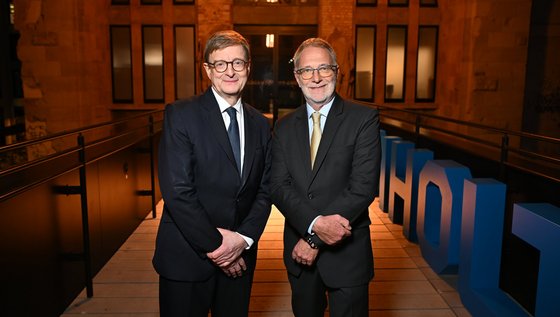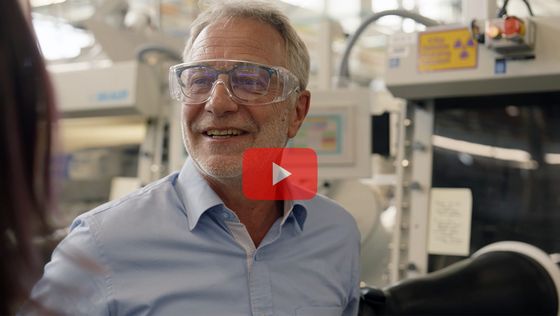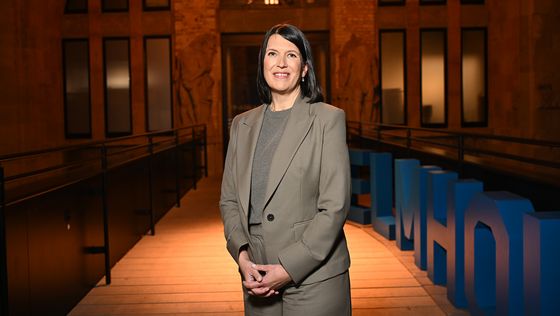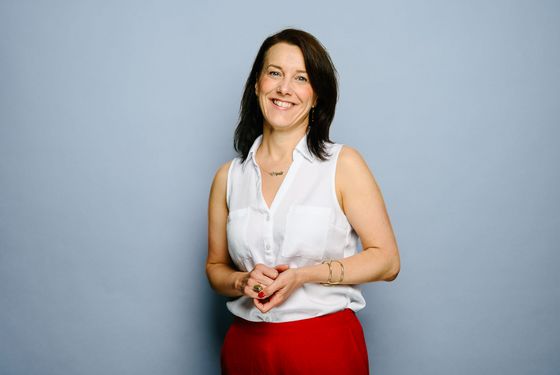|
||||||||
|
||||||||||||||||||||||||
|
|
The beginning of the week marked the start of a new chapter for Helmholtz: after ten years in office, the association bid farewell to Otmar D. Wiestler, who has shaped the research landscape with his passion and dedication. On November 1, he will be succeeded by Martin Keller – an internationally respected science manager who is returning to Germany after three decades in the US. We spoke with him in his former home about his motivations for taking on the job. We highly recommend watching the corresponding video in this issue. Also in this issue: Gerhard Fettweis outlines in the opinion piece, how Germany must position itself in microelectronics in order to become independent. Enjoy reading! |
|
|
|
|
Helmholtz marked the change of leadership with a festive event in Berlin. Otmar D. Wiestler was bid a fond farewell after ten years of service, while Martin Keller was warmly welcomed as the new president. A number of guests from politics, science, society, and the Helmholtz family attended the event. You can find impressions of the event here. |
|
|
Martin Keller, an internationally recognized science manager, is taking over as President of the Helmholtz Association. He most recently headed the National Renewable Energy Laboratory (NREL) in Golden, Colorado. When the head of one of the most important research institutes for renewable energy in the US returns to Germany after 30 years, it’s worth taking a closer look: Why Germany? Why now? Why Helmholtz? Martin Keller answered these questions in his speech at the handover ceremony: Who, if not Germany, should take on a leading international role in research and innovation? A country where excellent cutting-edge research is conducted, with long-term funding guaranteed by the government. Especially now, when other global players are backing out. And Helmholtz is exactly the right place to make a difference. Because, as Keller aptly put it, “Helmholtz is where the action is.” |
|
|
Sabine Helling-Moegen will take up her post as Helmholtz Managing Director at the same time as Martin Keller assumes office. The veteran science manager knows the organization from various perspectives: she began her career at the German Cancer Research Center (DKFZ) and later moved to the association’s administrative office. After a stint in the private sector, she took over administrative management of the German Center for Neurodegenerative Diseases (DZNE) – a position she held for over a decade. Helling-Moegen was recently named one of the most influential figures in German science management in the “100 Top of the Table 2025” series by the website Research.Table. |
|
|
||||||||||||||||||||||||||||||
|
|
|
Flu viruses are contagious even before the first symptoms appear. Despite this risk, the diagnostic options currently available are often expensive, complicated to use and, in many poorer regions of the world, simply unavailable. A research team led by Professor Lorenz Meinel from the University of Würzburg, in cooperation with experts from the Helmholtz Centre for Infection Research, has developed the technology for a new influenza self-test, as recently reported on in the journal ACS Central Science. The new diagnostic tool is based on the sensor molecule thymol – a naturally occurring substance found e.g. in thyme – and a virus-specific sugar building block. When it comes into contact with active influenza viruses, the thymol is released, producing a clearly recognizable taste. This system could be used anytime, anywhere, e.g. in the form of chewing gum or a lollipop that reacted to flu viruses in the saliva of those infected people and released the telltale flavor; in the mouths of non-infected individuals, nothing would happen. In this way, infections could be detected within minutes – and without the need for a laboratory, electricity, or medical personnel. It could make flu diagnosis quicker, cheaper and easier in the future. Moreover, the system is flexible: both the flavor carrier and the recognition component can be adapted. For example, they can be adjusted to produce sweet, bitter or salty flavors – even child-friendly ones. They can also be transferred to different pathogens. The method thus opens up exciting new possibilities for low-threshold diagnostics to cover viral and bacterial infections – from influenza to future pathogens not yet known today. The researchers are now working on incorporating the sensors into chewing gum or lollipops and making the system suitable for mass production. To do so, they are collaborating with FlareOn Biotech GmbH, a start-up launched by the University of Würzburg in 2024. The development process is expected to take around four years. Rapid test for influenza viruses: simply taste your way to test results
Acidic tumor environment promotes survival and growth of cancer cells Laying the foundation for a future quantum network – quantum channels tested in flight |
|
The most exciting thing for me is that my work really allows me to set things in motion – people, topics, and trends. As the research field representative for Helmholtz Health, I am directly connected to our Research Centers and their scientists. I can see good ideas as they arise and help to connect the relevant people with each other. I find it particularly fulfilling when collaborations grow, and when we match the pulse of our time with topics such as targeted prevention, digital health, AI, and biomedical engineering – and at the same time contribute to implementing Germany’s high-tech agenda.
I would significantly expand international cooperation in health research. Especially in times when many countries are once again focusing more on themselves, it is important to maintain the bridges between them and build new ones. Health is a global challenge – and many regions, especially in the Global South, need greater access to research and innovation. I see great potential in partnerships, for example with the Gates Foundation, to make a difference together, learn from each other, and strengthen capacities worldwide – not only through money, but also dedication, timing, and applying the right minds.
I would dine with my own scientific community – with my colleagues, researchers, and partners from the Helmholtz Health Centers, but also with international experts. These conversations are part of my everyday life anyway, and I value them greatly. Over dinner, you simply have more time to delve deeper: into research ideas, global challenges, and new ways of rethinking health. Such conversations give me energy – and are often the beginning of something new. |
|
|
|
Many of the highest-valued companies, such as Apple, Google, Amazon, Microsoft, Meta, Tesla, and Nvidia, are active in the field of microelectronics. Electronics and robotics are finding their way into more and more everyday products – whether in cars, kitchen appliances, or sporting goods. German manufacturers remain strong in the consumer goods sector, provided it is not dominated by electronics. But here, too, the number of complex, integrated electronic components is growing rapidly. Platform chips – i.e., the integrated microelectronics that software actually runs on – are a key technology. Those who can’t produce them themselves remain dependent: economically, in terms of security, and strategically. Germany needs to finally take this seriously. Why? Because those who can’t design chips themselves are forced to go to an external provider with a specific task and disclose their trade secrets to the provider. The provider develops a suitable solution – but often only with temporary exclusivity. After this period expires, the provider can also sell the same chip to the competition. So we’re not only giving away essential know-how, but also losing the ability to stand out on the market. We need to take our future into our own hands and ensure that Germany can design its own central platform chips. Our goal must be to excel in cutting-edge research for central platform chips – i.e., the building blocks on which software runs, sensors and actuators are controlled, and the entire intelligence of a complete system converges. We need to show that powerful, trustworthy platform chips can also be built in Europe – while maintaining clear control over their functions, security, and intellectual property. For us, ‘trustworthy’ means that the chips must be designed in such a way that they cannot be manipulated remotely without it being detected – and that it is possible to understand what they are doing and why at any time. And what’s more, chips that don’t cost 500 million euros to develop, but more like ten. By taking these steps, we could lay the foundation for small and medium-sized enterprises and start-ups to develop their own hardware – and thus truly keep innovation in their own hands. The high-tech agenda is an opportunity to finally strategically create these structures in Germany and establish a national center of excellence in the field of platform chips – with the Barkhausen Institute and the Helmholtz Center Dresden-Rossendorf as its long-standing partners. This is where the dependence or independence of our industry will be decided. Those who can develop platform chips themselves can protect their intellectual property and retain control over its functions and security. If we consistently implement the high-tech agenda, especially at the interface between microelectronics and software, then I’m very optimistic about the future. Germany is a resilient country. We can do this. |
|
Published by: Helmholtz Association of German Research Centres, Anna-Louisa-Karsch-Str.2, 10178 Berlin Editors: Sebastian Grote, Franziska Roeder, Martin Trinkaus Photo credit: Phil Dera (Editorial) No subscription yet? Click here to register If you no longer wish to receive our newsletter, simply click here: Unsubscribe © Helmholtz
|
![[Translate to Englisch:]](https://www.helmholtz.de/assets/helmholtz_gemeinschaft/_processed_/5/f/csm_Sebastian_Grote_Monthly_2025_600x600_a4a3af046c.png)






